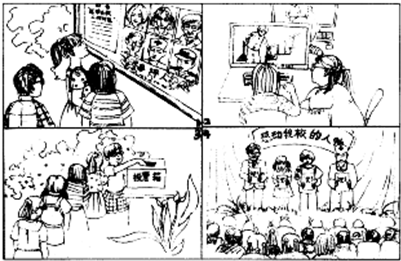题目内容
6.The questionbeing discussed(discuss) now at the meeting is very important..分析 现在正在会上讨论的问题非常重要.
解答 答案是being discussed,考查非谓语.根据题干提供的信息now,可见句子用现在时,动词discuss与名词question之间是被动关系,所以用being done 做定语修饰question"正在被讨论的".
点评 非谓语动词是高中语法的重点,也是难点,更是各省高考英语试题必考内容.解题的时候首先要确定选择非谓语,确定要选非谓语动词之后,第二步要分析其逻辑主语.非谓语动词虽不能作谓语,但仍具有动词特点,其逻辑上的动作执行者就叫做逻辑主语.非谓语动词作状语时,其逻辑主语须和句子的真正主语一致.若不一致,则须加上自己的逻辑主语.分析语态就是在确定逻辑主语之后,分析非谓语动词和逻辑主语在搭配使用时是主动还是被动关系是解题的关键.

练习册系列答案
相关题目
16.-Thank you so much for the lovely evening,Jim.
-_________.( )
-_________.( )
| A. | With pleasure | B. | You're welcome | C. | Never mind | D. | Forget it |
17.Teamwork is just as important in science as it is on the playing field or in the gym.Scientific investigations (调查) are almost always carried out by teams of people working together.Ideas are shared,experiences are designed,data are analyzed,and results are evaluated and shared with other investigators.Group work is necessary,and is usually more productive than working alone.
Several times throughout the year you may be asked to work with one or more of your classmates.Whatever the task your group is assigned,a few rules need to be followed to ensure a productive and successful experience.
What comes first is to keep an open mind,because everyone's ideas deserve consideration and each group member can make his or her own contribution.Secondly,it makes a job easier to divide the group task among all group members.Choose a role on the team that is best suited to your particular strengths.Thirdly,always work together,take turns,and encourage each other by listening,clarifying,and trusting one another.Mutual support and trust often make a great difference.
Activities like investigations are most effective when done by small groups.Here are some more suggestions for effective team performance during these activities:Make sure each group member understands and agrees to the task given to him or her,and everyone knows exactly when,why and what to do; take turns doing various tasks during similar and repeated activities; be aware of where other group members are and what they are doing so as to ensure safety; be responsible for your own learning,though it is by no means unwise to compare your observations with those of other group members.
When there is research to be done,divide the topic into several areas,and this can explore the issue in a very detailed way.You are encouraged to keep records of the sources used each person,which helps you trace back to the origin of the problems that may happen unexpectedly.A format for exchanging information (e.g.photocopies of notes,oral discussion,etc.) is also important,for a well-chosen method not only strengthens what you present but also makes yourself easily understood.When the time comes to make a decision and take a position on an issue,allow for the contributions of each member of the group.Most important of all,it is always wise to make decisions by compromise and agreement.
After you've completed a task with your team,make an evaluation of the team's effectiveness-the strengths and weaknesses,opportunities and challenges.
Several times throughout the year you may be asked to work with one or more of your classmates.Whatever the task your group is assigned,a few rules need to be followed to ensure a productive and successful experience.
What comes first is to keep an open mind,because everyone's ideas deserve consideration and each group member can make his or her own contribution.Secondly,it makes a job easier to divide the group task among all group members.Choose a role on the team that is best suited to your particular strengths.Thirdly,always work together,take turns,and encourage each other by listening,clarifying,and trusting one another.Mutual support and trust often make a great difference.
Activities like investigations are most effective when done by small groups.Here are some more suggestions for effective team performance during these activities:Make sure each group member understands and agrees to the task given to him or her,and everyone knows exactly when,why and what to do; take turns doing various tasks during similar and repeated activities; be aware of where other group members are and what they are doing so as to ensure safety; be responsible for your own learning,though it is by no means unwise to compare your observations with those of other group members.
When there is research to be done,divide the topic into several areas,and this can explore the issue in a very detailed way.You are encouraged to keep records of the sources used each person,which helps you trace back to the origin of the problems that may happen unexpectedly.A format for exchanging information (e.g.photocopies of notes,oral discussion,etc.) is also important,for a well-chosen method not only strengthens what you present but also makes yourself easily understood.When the time comes to make a decision and take a position on an issue,allow for the contributions of each member of the group.Most important of all,it is always wise to make decisions by compromise and agreement.
After you've completed a task with your team,make an evaluation of the team's effectiveness-the strengths and weaknesses,opportunities and challenges.
| Title | Working Together |
| Theme | Effective performance needs highly cooperated (71)teamwork |
| General rules | •Keep an open mind to everyone's (72)ideas/opinions/views/thoughts. •Divide the group task among group members. •(73)Support/Encourage and trust each other. |
| (74)Suggestions/Advice/Tips | •Understand and agree to the (75)given/assigned task of one's own. •Take turns doing various tasks. •Show concern for others to ensure safety. •Take (76)responsibility for one's own learning. •Compare your own observations with those of others. |
| Explore an issue | •Break the (77)topic/subject/issue into several areas. •Keep records of the sources just in (78)case. •(79)Exchange/Share your information with others via proper format. •Make all decisions by compromise and agreement. |
| (80)Evaluate effectiveness | •Analyze the strengths and weaknesses. •Find out the opportunities and challenges. |
